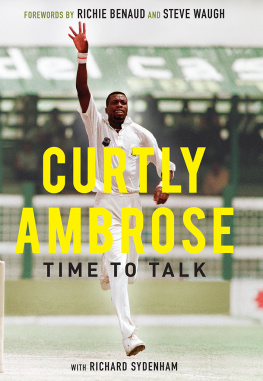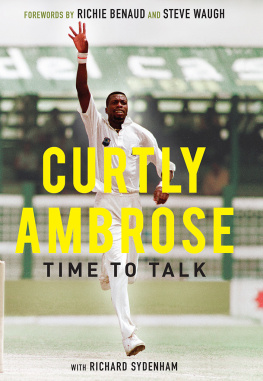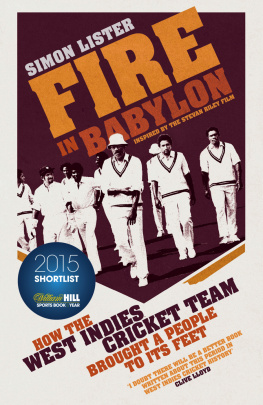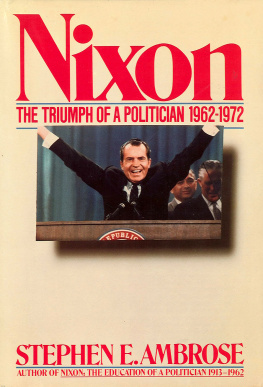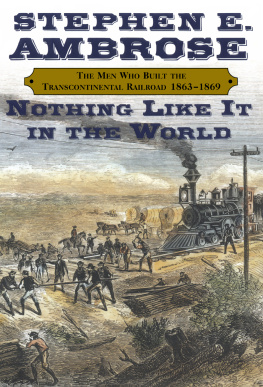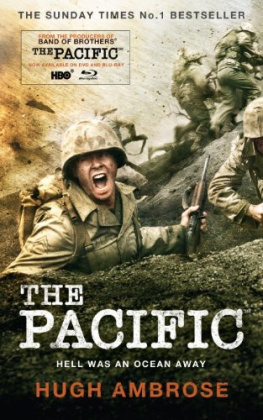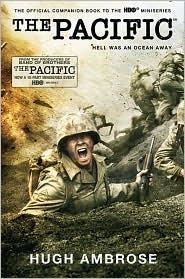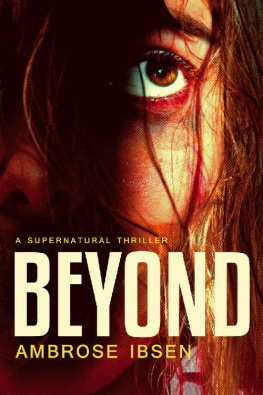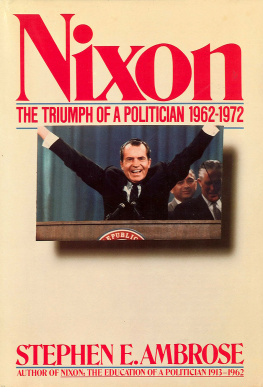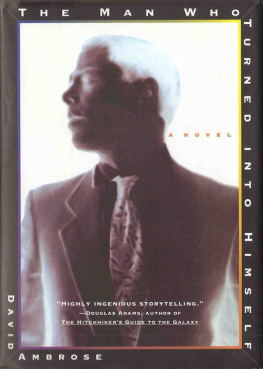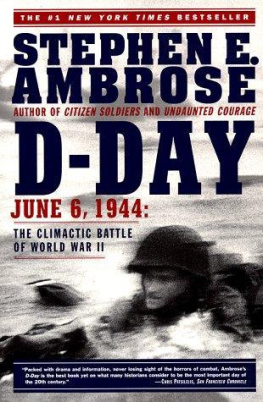Curtly Ambrose
First published in Great Britain
2015 by Aurum Press Ltd
7477 White Lion Street
Islington
London N1 9PF
www.aurumpress.co.uk
Copyright Sir Curtly Ambrose 2015
Foreword Richie Benaud 2015
Foreword Steve Waugh 2015
Curtly Ambrose has asserted his moral right to be identified as the Author of this Work in accordance with the Copyright Designs and Patents Act 1988.
All rights reserved. No part of this book may be reproduced or utilised in any form or by any means, electronic or mechanical, including photocopying, recording or by any information storage and retrieval system, without permission in writing from Aurum Press Ltd.
Every effort has been made to trace the copyright holders of material quoted in this book. If application is made in writing to the publisher, any omissions will be included in future editions.
A catalogue record for this book is available from the British Library.
ISBN 978 1 78131 437 1
eBook ISBN 978 1 78131 468 5
1 3 5 7 9 10 8 6 4 2
2015 2017 2019 2018 2016
eBook conversion by CPI Group (UK) Ltd, Croydon, CR0 4YY
Contents
Curtlys bowling brilliance in Perth to produce the victory by an innings and twenty-five runs [was] certainly one of the finest performances I have ever witnessed
Lucks a fortune is a phrase with which Ive grown up from the time I first played cricket in the backyard of our family home at North Parramatta in Sydney, Australia. As a youngster it neatly summed up for me that, although skill is vital for success, if the luck doesnt run with you, your cricketing life could be full of problems.
Being in the right place at the right time is of great importance. Luck was on my side early in 1993 when the West Indies toured Australia under Richie Richardsons captaincy. In the third Test of the series at the Sydney Cricket Ground I watched one of the greatest innings I have seen when Brian Lara stroked his way to 277.
That drawn game was followed by the Australia Day Test in Adelaide where West Indies won a nail-biter by one run.Then came Curtlys bowling brilliance in Perth to produce the victory by an innings and twenty-five runs; certainly one of the finest performances I have ever witnessed.
One of the quirks of the Perth ground is the breeze from the outer end, known as The Fremantle Doctor; pacemen and swing bowlers from domestic Sheffield Shield and overseas Test countries have fond memories of the assistance they have received over the years.
So, too, do members of the media because there is always something happening to provide interesting paragraphs for a written story, a radio commentary, or someone working on television where often it is a matter merely of adding a few words to the picture on the screen.
Luck comes in different guises. I was fortunate to be able to play in a New South Wales side at the same time as Ray Lindwall, Keith Miller (who had transferred from Victoria to NSW) and other outstanding pace bowlers. Then I was lucky to be around and commentate on others like Sir Curtly Ambrose.
I have found a good way to judge bowling abilities of those I am watching is to consider how I would have batted against them. With Curtly, I rated him as someone against whom I would have had a great deal of difficulty and I am full of admiration for what he achieved in his splendid career.
He has been a high-class bowler and cricketer.
Good luck Curtly, and well done.
Richie Benaud
Coogee, October 2014
Curtly Ambrose the most complete bowler I played against
The true greats have that little something extra, the ability to shift into another gear when it matters most often leading to their team taking control of the match. They have the X-factor and as such are both respected and feared by their opponents.
Curtly Ambrose was the most complete bowler I played against during my eighteen-year international career and the guy who tormented Australian teams more than anyone else. He seemed to revel in being the leader of the pack and assumed the mantle with a natural ease. He was a supreme fast-bowling machine whose languid approach to the crease, while mesmerising to the crowd, was both terrifying and often debilitating for the batsman, as he nervously awaited the impending interrogation. It came in two guises: firstly the technical examination of a batsmans technique upon being confronted by a beautifully balanced yet seemingly jet-propelled rhythmic action that delivered the ball from a perfect wristposition at a speed that required complete attention from the batsman to avoid embarrassment or injury. Each delivery prodded and probed every weakness which, when detected, resulted in a relentless pursuit of ones wicket. I always felt that while Curtly kept his strategies simple, he was always analysing your game and critiquing your technique after each delivery, searching for a chink in the armour that he could then exploit.
If you managed to survive his relentless line and length with exaggerated bounce and movement, or the random throat-seeking missile, you then had to confront the physicality of the man. His presence was, to many, overwhelming, with his towering height, deathly stare and imposing body language, leaving many batsmen unsure of his motives. Was he trying to get me out or threaten my very existence? Either was a real possibility, unless complete focus and attention was given to the task at hand. I found myself juggling both these options after I decided to kick over a hornets nest during our famous confrontation in Trinidad, when I offered Curtly some unwanted advice. Thankfully, Richie Richardson stepped in and saved me from what could have been an embarrassing conclusion to the confrontation. As usual Curtly had the last laugh, claiming six wickets in the innings on a pitch that offered both bounce and movement which, when added to his skill, made batting near-impossible.
We had another reminder of his skill when he steamrollered us in Perth, capturing seven for one in a spell that rates as one of the greatest of all time. Curtly had the killer instinct and could smell blood in the water and would up the ante to seize the moment for his team, often initiating panic in the opposition.
I loved the challenge of batting against him, for it provided a benchmark for me as to where I was at. To succeed against Curtly meant you had graduated as a Test batsman and all those hours of practice and sacrifice were worthwhile. Quite simply, he was the best I faced and each run scored off him had to be earned and thats exactly how Test cricket was meant to be played. Always 100 per cent!
Steve Waugh, Sydney, November 2014
I was fit enough and good enough to have played on for another eighteen months and maybe even two years, but I wanted to leave at the top of my game rather than have people say I should have retired a year ago. My pride is important to me and I know I left cricket at the right time
I first wanted to retire during the 1995 tour of England. I reconsidered my future and decided it wasnt the right time for me or West Indies cricket then I will expand on this later in the book. I felt more serious about retirement at the start of 1998. We had a tour of Pakistan in late 97 that we lost badly, 3-0. I missed the last match of that series with a slight back strain and since the series was gone there wasnt much point in me aggravating my back. So after that tour I thought to myself, Its time to finish with this cricket thing. I started to lose interest, the passion wasnt there any more and I didnt feel like going on. My plan was to play one last season with the Leeward Islands and try to win the domestic championship, finish on a high, and then call it a day, which would have meant not playing in the England series at the start of 1998. So I was set on retirement with West Indies.
Next page
